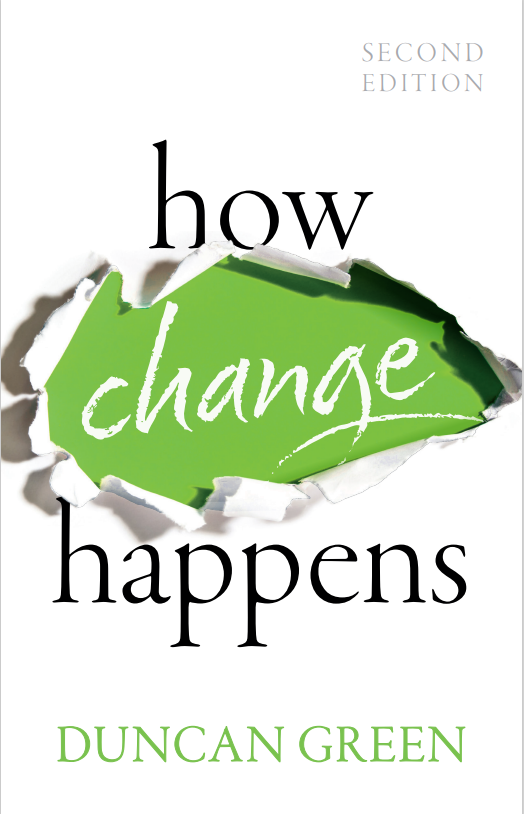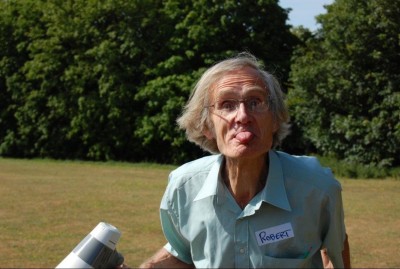
As I skimmed the new edition of How Change Happens, what struck me most was not the text, but the endorsements. When it first came out in 2016, I was full of busyness, cracking on with the next thing etc. Now, as I exit Oxfam and have a bit more downtime, I can appreciate things better. Not only that, but leaving Oxfam means I can safely ignore its stricture never to blow your own trumpet (or cut and paste someone else blowing it for you). I could scarcely believe these two commentaries on that first edition from Robert Chambers and Ha-Joon Chang, two of my all-time development heroes:
Robert Chambers:

‘Once again, following From Poverty to Power, Duncan has given us a remarkable tour de force, wide-ranging, readable, combining theory and practice, and drawing on his extensive reading and rich and varied experience. How Change Happens is a wonderful gift to all development professionals and citizens who want to make our world a better place. It confronts contemporary complexity, systems, power, and wealth and builds on an extraordinarily rich treasury of experience and evidence to give us a new, grounded realism for development practice. Only after reading and reflect ing have I been able to see how badly we have needed this book. It does more than fill a gap. The evidence, examples, analysis, insights, and ideas for action are a quiet but compelling call for reflection on errors and omissions in one’s own mindset and practice. Here then we have vital reading for all development professionals, practitioners, and activists, and all concerned citizens. It is as relevant and important for South as North, for funders as activists, for governments as NGOs, for transnational corporations as campaigning citizens. We are all in this together. How Change Happens should stand the test of time. It is a landmark, a must read book to return to again and again to inform and inspire reflection and action. I know no other book like it.’
Ha-Joon:
‘‘The philosophers have only interpreted the world, in various ways. The point, however, is to change it’, said Karl Marx in one of his most celebrated passages, which eventually became one of his two epitaphs (the other one being ‘Workers of all lands, unite’).
Marx was certainly right to argue that social theories should be not just about understanding the status quo but also about offering a vision for its improvement; but he was wrong to imply that no one before him had thought like that.
For the last several thousand years at least, human beings have tried to imagine a different world from the one they live in, and worked together to create it. Human history is littered with countless visions of—and struggles for—an alternative social order. These may have been large-scale social experiments based on elaborate theories, like Marxism, the welfare state, or neo-liberalism. Or they may have involved daily struggles for survival, safety, and dignity by oppressed and underprivileged people, even though they may not have had any sophisticated theory about their alternative world. However, the capacity to imagine an alternative social order and cooperating to create it is what distinguishes humankind from other animals.

Despite the fact that much of human history has been about attempting to create different realities, we do not understand the process of social change very well.
To be sure, we have grand historical narratives that describe social change as the results of interactions between technological forces and eco nomic institutions, such as property rights; Marxism is the best example of this. We know quite a bit about the way in which society is transformed because of the changes in political–legal institutions, such as the court system or international trade agreements. We have interesting and detailed accounts of how certain individuals and groups—whether they are political leaders, business leaders, trade unions, or grassroots groups—have succeeded in realizing visions that initially few others thought realistic.
However, we do not yet have a good theory of how all these different elements work together to generate social change. To put it a bit more dramatically, if someone wanted to know how she could change certain aspects of the community, nation, or the world she lives in, she would be hard pressed to find a decent guidebook.
Into this gap steps Duncan Green, the veteran campaigner for development and social justice, with How Change Happens, an innovative and thrilling field guide to—let’s not mince words—changing the world.
Many conventional discussions of how change happens focus on either technology (mobile phones can bring the revolution!) or a brutal account of realpolitik—how oligarchs and elites carve up the world. While not ignoring such factors, How Change Happens develops a far better frame work for understanding social change by focusing on power analysis and systemic understanding.
This power and systems perspective emphasizes that, in order to generate social change, we first need to understand how power is distributed and can be re-distributed between and within social groups: the emancipation of women; the spread of human rights; the power of poor people when they get organized; the shifting power relationships behind the negotiations around the international economic system. While emphasizing the role of power struggles, the book does not see them as voluntaristic clashes of raw forces, in which whoever has more arms, money, or votes wins. It tries to situate those power struggles within complex systems that are continuously changing in unpredictable ways, affecting and being affected by diverse factors like social norms, negotiations, campaigns, lobbying, and leadership.
Providing a theory of social change that is convincing is already a tall order, but Duncan Green sets himself an even higher bar. The book aims to be a practical field guide to social activism. More than that, it aspires to be a field guide not just for the kinds of people he normally works with, such as NGO campaigners or grassroots organizers. It is meant to be a field manual for activists in the broadest sense: politicians, civil servants, businesspeople, even academics.
This is certainly a hugely ambitious project; how can anyone write a book that can provide sophisticated theories of social change, while providing practical advice to activists?
However, amazingly, How Change Happens delivers on its promise. Those who are purely interested in understanding better how societies change will find a treasure trove of theoretical insights and empirical evidence. Those who want to change the world through formal politics will certainly learn a lot from the book in terms of how to establish political consensus and legitimacy, how to build coalitions, and how to use national and international laws to initiate and consolidate changes. Civil servants who want to make things better for citizens or business leaders who want to do more than simply maximize profits will also find plenty of lessons to draw from the book in devising policies and corporate strategies that can make the world a better place in realistic but innovative ways. The book will even help academics, like myself, who try to engage with real-world issues, to grasp better the role that their research and outreach activities can play in bringing about (or hindering) social change.
Drawing on his impressive knowledge of the relevant areas of the social sciences, his thirty-five years of diverse experience in international development and many first-hand examples from the global experience of Oxfam, one of the world’s largest social justice NGOs, Duncan Green has produced a unique and uniquely useful book addressing a hugely important but largely neglected issue. Everyone who is interested in making the world a better place should thank him for it.’
Hard to express what these mean to me, but let’s just say that in this aspect of my life, I can die happy. It also means I really am very reluctant to write another book – the only way is down…..
That’s a brilliant and inspiring legacy . Will look to read the book.
Blow that trumpet Duncan!
Sitting in some of the most difficult places and running huge and diverse programme, reading what you write was such a relief. You brought theory and practice together so wonderfully and created opportunities to learn for many of us who were so distant from it because of isolation. Your writings provided us with weapons with which to challenge the one sidedness of development. Thankyou
Author
That means a lot Masood, thanks so much!
Yes – enough of writing (for a while at least).
Do a Jimmy Carter – go forth and get your hands dirty!
“Only connect! That was the whole of her sermon. Only connect the prose and the passion, and both will be exalted, and human love will be seen at its height. Live in fragments no longer.”
Hi Duncan,
I finally got to read the updates to your book, congratulations! Last year I used your book as one of the key readings for a new project-based learning course with first year undergraduate students. The students developed their own social change projects throughout the year, reflecting about power and politics along the way. It worked really well and feedback was very positive!
Thank you for making this book happen 🙂
Author
Thanks Ana Luisa, good to hear